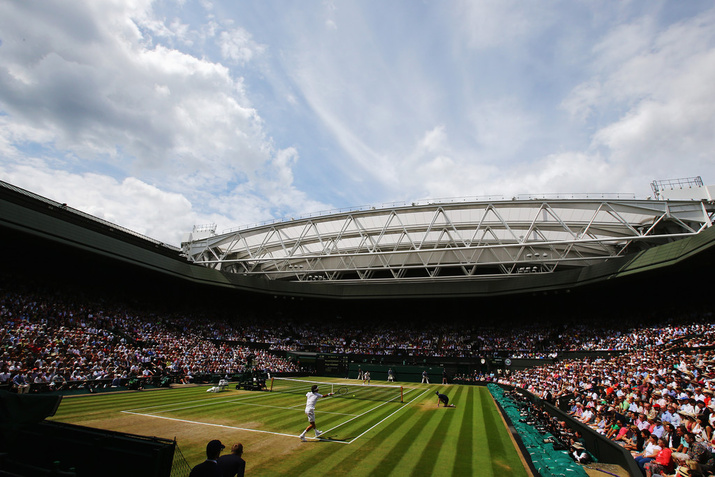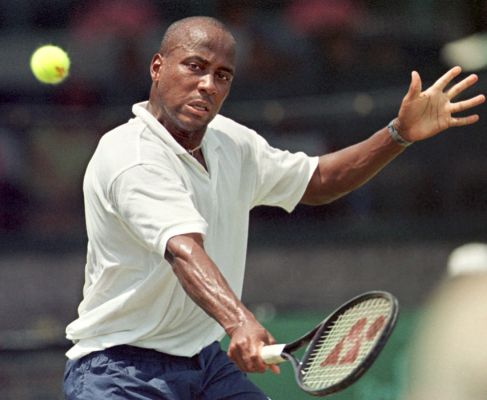Don't miss any stories → Follow Tennis View
FollowWimbledon History: MaliVai Washington's 1996 Finals Run
Twenty years ago, one of the most unlikely Wimbledon finals of the Open Era took place when Richard Krajicek of the Netherlands defeated American MaliVai Washington in the first major final for both players. Tennis View spoke with Washington, part of one of the best groups of American players of all time, on the finals run, history, and what he’s doing now. This is the first of a two-part interview.

Tennis View: It’s crazy how time flies, isn’t it?
MaliVai Washington: Yes, and it’s hard to believe that it’s actually 20 years because I don’t feel like I’m that old. But when you say 20 years, it indicates that you are that old!
TV: What were your thoughts heading into the fortnight in ‘96?
MW: Interestingly, prior to '96, I never had a lot of success at Wimbledon. I felt like I should be able to play well there. I'd done pretty well at grass court tournaments at Queen's and at Manchester in the past, but for whatever reason at Wimbledon … I don't think I'd been past the third round prior to Wimbledon ‘96.
But whenever I approached Wimbledon, I was extremely excited about it. There were years when I didn't have success there, I remember thinking, “Geez, maybe one of these years I won’t even play Wimbledon just because I never seem to have success.”
And then you kind of catch yourself because you realize this is Wimbledon. This is a Grand Slam. This is a great opportunity that most people don't get. That was a fleeting thought in my mind for probably about two seconds over the years when I wasn't having success at Wimbledon. You can't ever just give up and say “It's not working out” because for whatever reason in 1996, things came together and worked in my favor.
When a Grand Slam tournament comes around, especially Wimbledon, you be prepared and play with all your heart.
TV: Wimbledon during the 1990s had to be considered a difficult place to play for anyone, considering how much Pete Sampras dominated there during the decade. Did the fact that he was on the opposite side of the draw affect how you approached the tournament in ’96?
MW: Honestly, anyone on the other half of the draw for me at any tournament had no significance. For me, I didn't even like to think two or three rounds ahead. At the professional level, I don't care who you are, you can't afford to start looking at the draw and start projecting who you'll play in the quarterfinals or the round of 16, because if you do that, I think you'll find yourself sitting on the couch looking at that guy play in the round of 16.
You really have to stay focused on that one individual who's your next opponent. That's how I always tried to approach it and that's certainly the way I did it at Wimbledon. I wasn't even looking at whom I could potentially play in the second round.

TW: Working your way through the draw, you found yourself in the semifinals against your good friend and fellow American Todd Martin. You split the first four sets, but you end up in a major hole in the fifth, with Todd going up 5-1 and serving for a spot in the finals. What’s going through your mind at that point?
MW: I think my initial thought is I've got him right where I want him!
Actually, let me start off by saying this: I always feel throughout the course of the year you probably win a couple of matches that you should’ve lost and you lose a couple of matches that you probably should've won. I kind of found that throughout the course of my career. That's always the case in sports.
That was a match Todd probably should've won and I should've lost but for whatever reason, things were aligned for me to win that match. And I remember thinking at 5-1, specifically saying to myself, “Just make him play.”
And the term I like to use, I use this with young players today, “See if they have the guts to serve it out.” And Todd was serving at 5-1 and I'm trying to make him play, trying to make him hit volleys. You don't want to make errors when a guy is serving to get in the finals of Wimbledon. You want to make him hit a lot of balls and see if they'll succumb to the pressure. So I was trying to make him hit a lot of balls. I remember it was a 15-30 point, I hit a running forehand winner down the line and the crowd erupted bigger than it had the entire match and I find myself with a break point. I get a break.
After the break, I'm thinking the same thing. Last thing I want to do is lose serve to lose a match, so I'm thinking just hold serve, get a lot of first serves in, make him play, make him serve out the match if he's going to win. And then, one game after another, it just kept going in my favor. And as I got to 5-2, 5-3, the crowd is getting a little more boisterous, kind of seeing this comeback. I've been in situations where I've served for the match and lost, so to some degree I'm thinking Todd is feeling the pressure. I know I'm feeling the pressure: it's the semifinals of Wimbledon!
TV: By winning that match, you also notched a historic achievement by becoming the second African-American male to make a Grand Slam final after Arthur Ashe. Did that sink in right away or did your mind turn immediately to the finals?
MW: Honestly, if it hadn't been asked in the press conference, it may not have crossed my mind. I don't feel like when you're in the middle of a tournament, you're thinking about the value of what it’s going to mean in the history books and in the future. You're thinking, “How do I win the next match?”
You know the fans and the media and whomever else, that's part of their job to think about the historical value of it. In a situation like that you don't need any more pressure on you. And then after it was brought up … certainly I knew the historical value of it and it'd be great to be the second great black person to win Wimbledon, you definitely don't need more pressure on you. Which is why I have such great admiration for those players who have the ability year-in, year-out to win and win and win, seemingly under immense pressure and they're still able to perform. It's just fun to watch because I wish I could've done that!
I was in the finals of Wimbledon and got to No. 11 in the world and I imagine there are some people that are like, “Man, I wish I would've had Mal Washington's career.” I'm sitting here as Mal Washington thinking, “Man, I would've liked to achieve some of those things those Grand Slam champions achieved. ” As an athlete you're always trying to figure out, how do you get to that point? How do you achieve that?
It's more than the physical part of tennis, it's the mental part. That's the trick in sports—trying to figure out how to play at a high level consistently and when it matters the most. And the best players are those who figure it out.

TV: Did you ever feel any outside pressure during your career of representing the black community, and making major inroads in the game?
MW: One of the ways I handled it, I want to be the best player in the world and I want to be the best player I can be. And by default, I would be the best black player. My focus was on doing everything I could to be the best player in the world. And to win titles, and with that comes other accolades, statistics and pressures.
I think I'd say there was a level of pressure of being the first black player to achieve certain things, or the first since Arthur, but that's part of the sport. You’re going to deal with some type of pressure. Whether it's the first person in your race or first person in your country to do something, or [Novak] Djokovic winning Roland Garros for the first time, there's always going to be pressure, and how you deal with it is paramount in sports.










